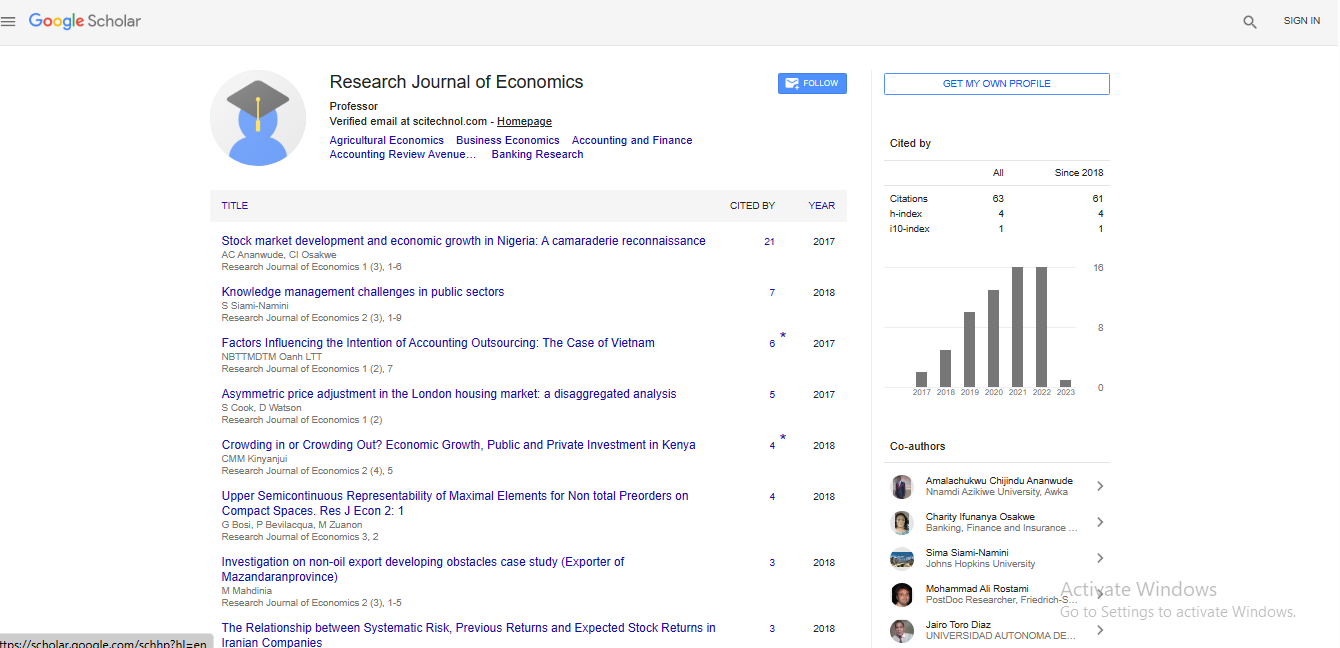Commentary, Res J Econ Vol: 7 Issue: 2
Identifying the Root Causes of Global Financial Crisis
Aslam Sarah*
1Department of Management Sciences, COMSATS University, Islamabad, Attock Campus, Pakistan
*Corresponding Author: Aslam Sarah
Department of Management Sciences,
COMSATS University, Islamabad, Attock Campus, Pakistan
E-mail: sarah.a@gmail.com
Received date: 16 February, 2023, Manuscript No. RJE-23-96610;
Editor assigned date: 20 February, 2023, PreQC No. RJE-23-96610 (PQ);
Reviewed date: 06 March, 2023, QC No. RJE-23-96610;
Revised date: 13 March, 2023, Manuscript No. RJE-23-96610 (R);
Published date: 20 March, 2023, DOI: 10.4172/RJE.1000137
Citation: Sarah A (2023) Identifying the Root Causes of Global Financial Crisis. Res J Econ 7:2.
Description
The Global Financial Crisis (GFC) of 2008 was one of the worst financial disasters in modern history. The crisis, which started in the United States, quickly spread to other parts of the world and caused severe economic downturns and social disruptions. The GFC had farreaching consequences, including job losses, home foreclosures, bankruptcies, and government bailouts.
Causes of the global financial crisis
The GFC had multiple causes, including the rapid expansion of the housing market, the proliferation of subprime mortgages, and the widespread use of complex financial instruments such as Collateralized Debt Obligations (CDOs) and Credit Default Swaps (CDSs). The housing market boom was fueled by low interest rates, lax lending standards, and speculation. Many people who could not afford to buy homes were given subprime mortgages with low initial interest rates that later ballooned, making the mortgages unaffordable. The subprime mortgages were bundled together and sold to investors as CDOs, which were given high credit ratings by rating agencies despite their high risk. The CDSs were used to hedge against the risk of default, but they turned out to be unreliable and contributed to the contagion effect of the crisis.
Consequences of the global financial crisis
The GFC had severe economic and social consequences. In the United States alone, more than 8 million jobs were lost, and the unemployment rate rose to 10 percent. Many homeowners lost their homes to foreclosure, and the value of real estate plummeted. Banks and financial institutions suffered significant losses and had to be bailed out by the government. The bailouts were unpopular and raised concerns about moral hazard, as some banks continued to engage in risky behavior after being rescued. The crisis also had global consequences, as many countries were affected by the downturn in trade and investment. The GFC led to a widespread loss of confidence in the financial system and highlighted the need for better regulation and oversight.
Lessons learned
The GFC taught us several important lessons. First, it showed the dangers of excessive speculation and risk-taking in the financial sector. Second, it highlighted the need for better regulation and oversight of financial institutions, including rating agencies. Third, it demonstrated the importance of transparency and accountability in the financial system. Fourth, it underscored the need for international coordination and cooperation in responding to financial crises. Finally, it emphasized the importance of addressing the root causes of inequality and economic insecurity, which can exacerbate financial crises.
The global financial crisis of 2008 was a devastating event that had far-reaching consequences. It was caused by a combination of factors, including the housing market boom, subprime mortgages, and complex financial instruments. The crisis had severe economic and social consequences, including job losses, home foreclosures, and government bailouts. The GFC also taught us several important lessons, including the need for better regulation and oversight, transparency and accountability, and international cooperation. As we move forward, it is important to apply these lessons to prevent similar crises from happening in the future.
 Spanish
Spanish  Chinese
Chinese  Russian
Russian  German
German  French
French  Japanese
Japanese  Portuguese
Portuguese  Hindi
Hindi 